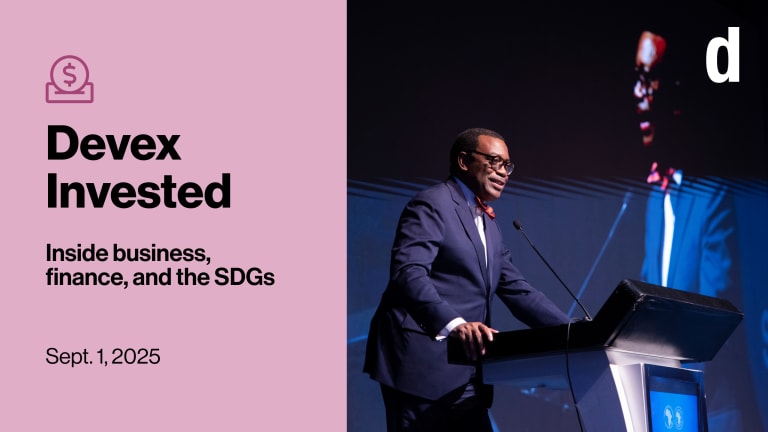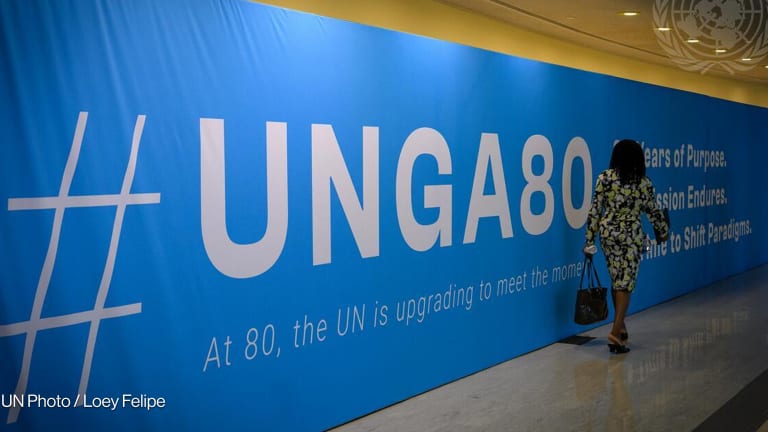
As world leaders descend on New York City this week for the 80th United Nations General Assembly, you’re likely to see people walking around Midtown Manhattan with name tags and playing “guess the flag” as you stumble across a protest.
One of the central questions at this year's UNGA shouldn’t be a big surprise: where will the aid money come from? The cash is drying up just as global cooperation frays, and defense spending is at record highs — $2.7 trillion in 2024, the steepest jump since the late 1980s — while aid budgets are shrinking fast. Official development assistance, or ODA, is expected to plunge another 9% to 17% this year after sharp cuts in 2024, leaving a $4 trillion annual gap for achieving the Sustainable Development Goals. As U.N. disarmament chief Izumi Nakamitsu warns, “Rising global military expenditures are not delivering peace.”
Rather than calling on governments to step up, many leaders gathering this week — from Barbados’ Mia Mottley to the United Kingdom’s Gordon Brown — said it’s time to look elsewhere.
“In the absence of an international rules-based order, we are no different from children on a playground running from the bully and hoping that we can get through lunch time without somebody taking our food,” Mottley said during a private roundtable at The Rockefeller Foundation yesterday. “We potentially face a moment where numbness is the order of the day.”
The funding push now seems to be turning away from Western countries and toward a new, more varied army of donors largely made up of philanthropy and private investors. David Miliband, the president and CEO of the International Rescue Committee, said that rather than trying to get a global agreement of 193 countries, we should be “mobilizing energy wherever we can find it.” He advocated for a system of “minilateralisms” rather than multilateralism. A world where the future of development relies less on governments and more on the risk-taking of civil society, philanthropy, and the private sector.
“Maybe then the government institutions can come in behind the solutions, rather than us expecting them to be the solution makers,” Miliband said. “There are 91 autocracies and 89 democracies in the world, we're going to have to mobilize the energy from wherever we can find it, to build the countervailing power in the name of the values that bring us here today.”
This week, my colleagues and I will be covering not only UNGA — but also Climate Week NYC, Devex’s very own Impact House, and the hundreds of side events in between. Keep up to date with our reporters’ notebook.
Read our Day 1 entries: UNGA80 reporters’ notebook
What to watch:
• The SDGs at crossroads: A new era for global development?
• Redesigning development finance for a new era
• Top UN official defends reform agenda as genuine, despite skepticism (Pro)
+ Don’t miss out on the hard-hitting conversations on timely global development issues and networking events we’re offering during UNGA80, visit the Devex Impact House page to learn more and register to receive on-demand content.
Dollar signs
As pressure rises for nonstate players to step up, Climate Week and UNGA offer an opportunity for investors. With major greenhouse gas emitters such as India, the European Union, and China still holding back their updated climate pledges, markets are watching closely for signals of where policy — and capital — will flow next.
The pledges, called nationally determined contributions, or NDCs, are essentially national road maps for energy transition that countries must submit every five years to keep global warming below 1.5 degrees Celsius. As United Nations Development Programme’s Marcos Neto puts it, the submissions due this year are “more ambitious, more investible.” In practice, that means clearer frameworks for scaling clean tech, expanding renewables, and building resilient supply chains — exactly the conditions investors want for long-term confidence.
The private sector isn’t just waiting on the sidelines. From Australia’s “Business for 75” coalition to India’s heavy industries betting on green hydrogen, companies are positioning themselves around NDCs as if they were investment prospectuses. Andrew Prag of the We Mean Business Coalition underscored the point to me recently: the stronger the targets, the stronger the case for capital. With renewable energy now outcompeting fossil fuels on price in most markets, the upside is obvious. Investors who track and align with ambitious NDCs — especially those likely to come from the EU and China in the coming months — stand to be at the front of the line for opportunities in what remains the fastest-growing sector of the global economy.
Read: All eyes on missing NDCs as Climate Week and UNGA converge
Maybe money can grow on trees
Today, Brazilian President Luiz Inácio Lula da Silva is expected to announce the first investment in the much-awaited Tropical Forest Forever Facility, or TFFF — an investment fund set to be operationalized at the 30th U.N. Climate Change Conference, or COP30, that will reward countries that can keep their forests standing. Depending on whether the Organisation for Economic Co-operation and Development shifts how it accounts for blended finance, money invested into TFFF could potentially count as ODA.
The fund could bring a significant payday for some developing countries. For example, if the fund was already operational and the Democratic Republic of Congo stopped deforesting entirely, it would receive $399 million per year — that’s about 2% of the DRC’s total government budget.
TFFF could be attractive to governments as well: The OECD is currently in discussions about shifting how it accounts for blended finance. It may change it so that any money that goes to ODA-eligible countries — even if it’s in the form of an investment — could be counted as ODA. As the EU scales back its development finance and pushes for a “Europe First” take on ODA, TFFF could offer an investment-led way to check off its ODA boxes.
It might be a place for the private sector to jump in as well. We’re hearing that KPMG and Salesforce will organize a consultation for the private sector on TFFF.
ICYMI: Brazil's forest finance plan takes shape ahead of COP30
Meanwhile, across the pond
British International Investment, or BII, has quietly amassed influence abroad as a public finance institution, tripling its commitments since 2015 and focusing heavily on large emerging markets. But a report by Bond, the network for U.K. development NGOs, questions BII’s methodology, pointing out that the institution is strategically tilting toward middle-income countries, where scale and returns are more predictable. That focus may reassure commercial partners, but critics argue it strays from BII’s poverty mandate.
Your next job?
Investment Officer – Sustainable Finance
International Finance Corporation
United States
“BII appeals to the Treasury because its funding does not count as spending in the Government accounts and its capitalisation has continued despite steep cuts in the overall aid budget,” Ian Mitchell, senior policy fellow at the Center for Global Development, tells Devex. “With only a fraction of its finance reaching the poorest countries it will do little for the Government’s poverty goal.”
In a recent Devex opinion piece, BII CEO Leslie Maasdorp writes about the institution’s new work to help Africa’s small and medium-sized enterprises — the backbone of its economies — which face a $21 billion funding gap across sub-Saharan Africa. He highlights BII’s Growth Investment Partners model, launched in Ghana and now in Zambia, which bridges this gap through permanent capital, flexible long-term financing, and technical assistance for underserved businesses, particularly those led by women and Black entrepreneurs.
Maasdorp frames this initiative as part of BII’s broader “platforms” approach, building locally driven partnerships to tackle neglected development challenges and mobilize private capital across sectors from renewable energy to health and infrastructure.
Read: BII has grown — but is it delivering for the poorest?
Opinion: Financing models are failing African SMEs, so we’re pioneering solutions
Further reading: Inside BII’s strategy to unlock private capital in Africa’s fragile markets (Pro)
+ Not yet a Pro member? Start your 15-day free trial today to access all our expert analyses, insider reporting, funding data, exclusive events and briefings with sector leaders, policymakers and influencers, and more.
What we’re reading
Rights groups call for probe of World Bank hospital funding. [Bloomberg]
U.S. House committee passes bill reauthorizing the U.S. International Development Finance Corporation amid larger State Department overhaul. [Devex]
The World Bank and climate projects: A matter of definition. [Center for Global Development]








